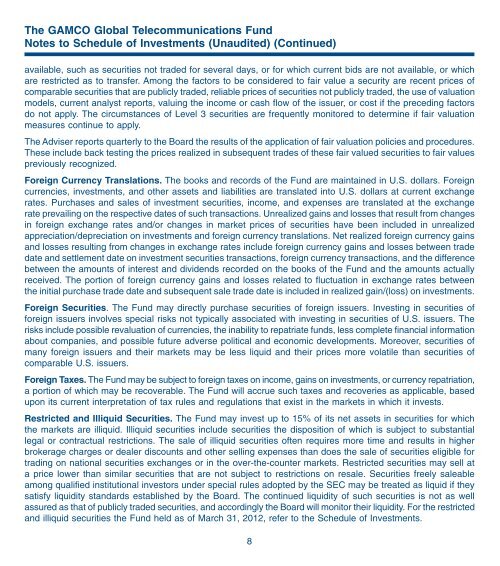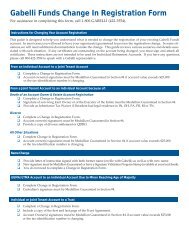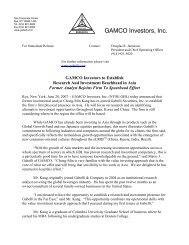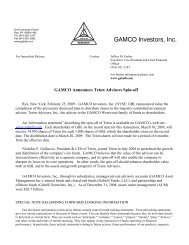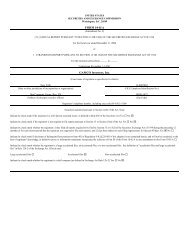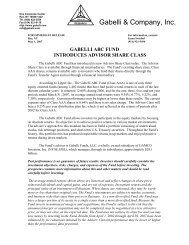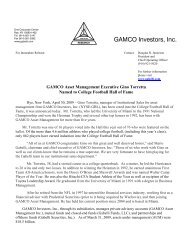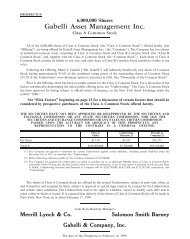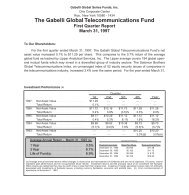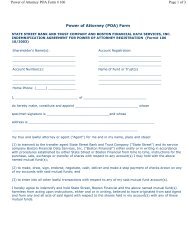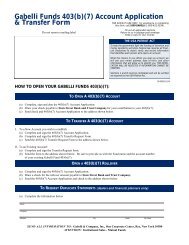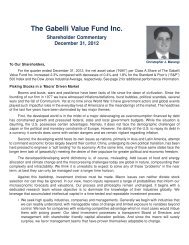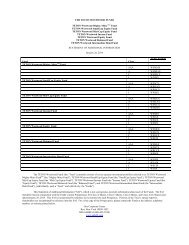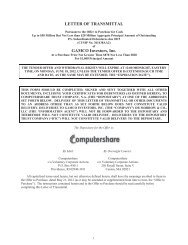The GAMCO Global Telecommunications Fund - Gabelli
The GAMCO Global Telecommunications Fund - Gabelli
The GAMCO Global Telecommunications Fund - Gabelli
You also want an ePaper? Increase the reach of your titles
YUMPU automatically turns print PDFs into web optimized ePapers that Google loves.
<strong>The</strong> <strong>GAMCO</strong> <strong>Global</strong> <strong>Telecommunications</strong> <strong>Fund</strong><br />
Notes to Schedule of Investments (Unaudited) (Continued)<br />
available, such as securities not traded for several days, or for which current bids are not available, or which<br />
are restricted as to transfer. Among the factors to be considered to fair value a security are recent prices of<br />
comparable securities that are publicly traded, reliable prices of securities not publicly traded, the use of valuation<br />
models, current analyst reports, valuing the income or cash flow of the issuer, or cost if the preceding factors<br />
do not apply. <strong>The</strong> circumstances of Level 3 securities are frequently monitored to determine if fair valuation<br />
measures continue to apply.<br />
<strong>The</strong> Adviser reports quarterly to the Board the results of the application of fair valuation policies and procedures.<br />
<strong>The</strong>se include back testing the prices realized in subsequent trades of these fair valued securities to fair values<br />
previously recognized.<br />
Foreign Currency Translations. <strong>The</strong> books and records of the <strong>Fund</strong> are maintained in U.S. dollars. Foreign<br />
currencies, investments, and other assets and liabilities are translated into U.S. dollars at current exchange<br />
rates. Purchases and sales of investment securities, income, and expenses are translated at the exchange<br />
rate prevailing on the respective dates of such transactions. Unrealized gains and losses that result from changes<br />
in foreign exchange rates and/or changes in market prices of securities have been included in unrealized<br />
appreciation/depreciation on investments and foreign currency translations. Net realized foreign currency gains<br />
and losses resulting from changes in exchange rates include foreign currency gains and losses between trade<br />
date and settlement date on investment securities transactions, foreign currency transactions, and the difference<br />
between the amounts of interest and dividends recorded on the books of the <strong>Fund</strong> and the amounts actually<br />
received. <strong>The</strong> portion of foreign currency gains and losses related to fluctuation in exchange rates between<br />
the initial purchase trade date and subsequent sale trade date is included in realized gain/(loss) on investments.<br />
Foreign Securities. <strong>The</strong> <strong>Fund</strong> may directly purchase securities of foreign issuers. Investing in securities of<br />
foreign issuers involves special risks not typically associated with investing in securities of U.S. issuers. <strong>The</strong><br />
risks include possible revaluation of currencies, the inability to repatriate funds, less complete financial information<br />
about companies, and possible future adverse political and economic developments. Moreover, securities of<br />
many foreign issuers and their markets may be less liquid and their prices more volatile than securities of<br />
comparable U.S. issuers.<br />
Foreign Taxes. <strong>The</strong> <strong>Fund</strong> may be subject to foreign taxes on income, gains on investments, or currency repatriation,<br />
a portion of which may be recoverable. <strong>The</strong> <strong>Fund</strong> will accrue such taxes and recoveries as applicable, based<br />
upon its current interpretation of tax rules and regulations that exist in the markets in which it invests.<br />
Restricted and Illiquid Securities. <strong>The</strong> <strong>Fund</strong> may invest up to 15% of its net assets in securities for which<br />
the markets are illiquid. Illiquid securities include securities the disposition of which is subject to substantial<br />
legal or contractual restrictions. <strong>The</strong> sale of illiquid securities often requires more time and results in higher<br />
brokerage charges or dealer discounts and other selling expenses than does the sale of securities eligible for<br />
trading on national securities exchanges or in the over-the-counter markets. Restricted securities may sell at<br />
a price lower than similar securities that are not subject to restrictions on resale. Securities freely saleable<br />
among qualified institutional investors under special rules adopted by the SEC may be treated as liquid if they<br />
satisfy liquidity standards established by the Board. <strong>The</strong> continued liquidity of such securities is not as well<br />
assured as that of publicly traded securities, and accordingly the Board will monitor their liquidity. For the restricted<br />
and illiquid securities the <strong>Fund</strong> held as of March 31, 2012, refer to the Schedule of Investments.<br />
8


